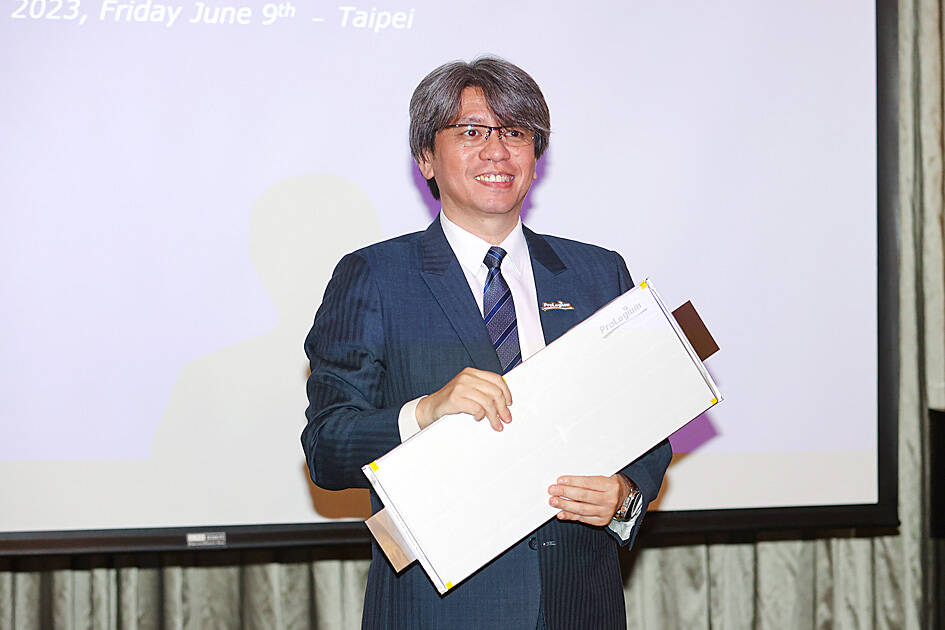Electric vehicle (EV) battery maker ProLogium Technology Co (輝能科技) would continue to expand its operations in Taiwan despite announcing it would build a new “gigafactory” in France, company founder and chief executive officer Vincent Yang (楊思枏) said yesterday.
“It is clear that we are rooted in Taiwan, and [we are] expanding overseas on a foundation built in Taiwan,” Yang told a news conference cohosted by the French Office in Taipei.
The company’s first gigafactory in Taoyuan would be ready for mass production at the end of this year, he said, adding that it would be a “demonstration model” as ProLogium seeks to expand its production overseas.

Photo: CNA
ProLogium has doubled its workforce in Taoyuan to more than 800 over the past year and that number is expected to surpass 1,000 by the end of the year, he said.
Yang last month announced an investment of US$5.7 billion in France.
The solid-state battery manufacturer founded in Taiwan in 2006 would build a plant with production capacity of 48 gigawatt-hours, and a research and development center in Dunkirk in northern France, which is where several EV makers and battery solution providers are based.
By expanding its presence in France, ProLogium would be able to provide batteries to EV and non-EV manufacturers in Europe, and get easier access to raw materials provided by European suppliers, Yang said
Construction of the gigafactory in Dunkirk, which is to be ProLogium’s first overseas plant, is expected to start next year, with production of next-generation batteries projected to begin in 2027.
He declined to provide details on the subsidies to be provided by the French government, saying talks on the issue were still being finalized.
Jean-Francois Casabonne-Masonnave, head of the French Office in Taipei, said that Paris has always provided subsidies to foreign companies investing in France in accordance with EU law.
Francois Cotier, director of Business France Taiwan, later told reporters that France welcomes Taiwanese investment in the nation, especially investment focused on biotechnology, e-mobility and other advanced technologies.

Vincent Wei led fellow Singaporean farmers around an empty Malaysian plot, laying out plans for a greenhouse and rows of leafy vegetables. What he pitched was not just space for crops, but a lifeline for growers struggling to make ends meet in a city-state with high prices and little vacant land. The future agriculture hub is part of a joint special economic zone launched last year by the two neighbors, expected to cost US$123 million and produce 10,000 tonnes of fresh produce annually. It is attracting Singaporean farmers with promises of cheaper land, labor and energy just over the border.

US actor Matthew McConaughey has filed recordings of his image and voice with US patent authorities to protect them from unauthorized usage by artificial intelligence (AI) platforms, a representative said earlier this week. Several video clips and audio recordings were registered by the commercial arm of the Just Keep Livin’ Foundation, a non-profit created by the Oscar-winning actor and his wife, Camila, according to the US Patent and Trademark Office database. Many artists are increasingly concerned about the uncontrolled use of their image via generative AI since the rollout of ChatGPT and other AI-powered tools. Several US states have adopted

A proposed billionaires’ tax in California has ignited a political uproar in Silicon Valley, with tech titans threatening to leave the state while California Governor Gavin Newsom of the Democratic Party maneuvers to defeat a levy that he fears would lead to an exodus of wealth. A technology mecca, California has more billionaires than any other US state — a few hundred, by some estimates. About half its personal income tax revenue, a financial backbone in the nearly US$350 billion budget, comes from the top 1 percent of earners. A large healthcare union is attempting to place a proposal before

KEEPING UP: The acquisition of a cleanroom in Taiwan would enable Micron to increase production in a market where demand continues to outpace supply, a Micron official said Micron Technology Inc has signed a letter of intent to buy a fabrication site in Taiwan from Powerchip Semiconductor Manufacturing Corp (力積電) for US$1.8 billion to expand its production of memory chips. Micron would take control of the P5 site in Miaoli County’s Tongluo Township (銅鑼) and plans to ramp up DRAM production in phases after the transaction closes in the second quarter, the company said in a statement on Saturday. The acquisition includes an existing 12 inch fab cleanroom of 27,871m2 and would further position Micron to address growing global demand for memory solutions, the company said. Micron expects the transaction to